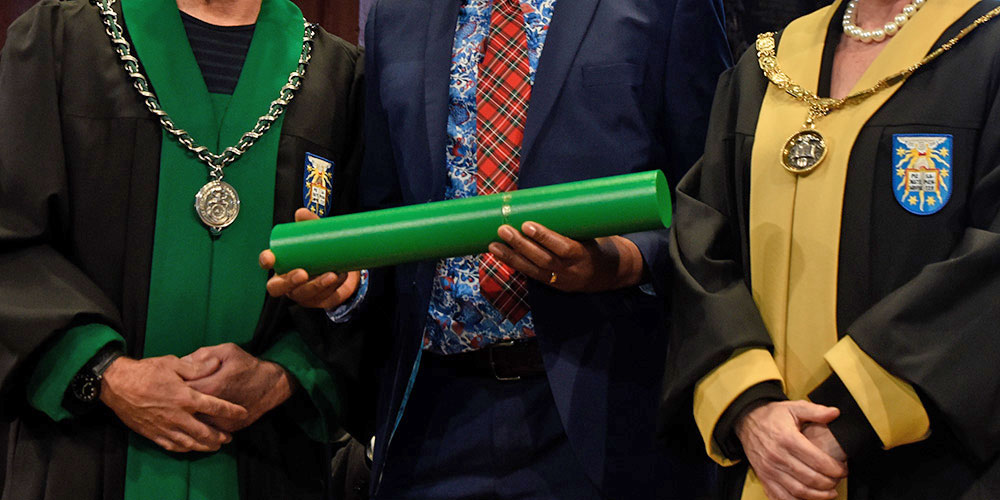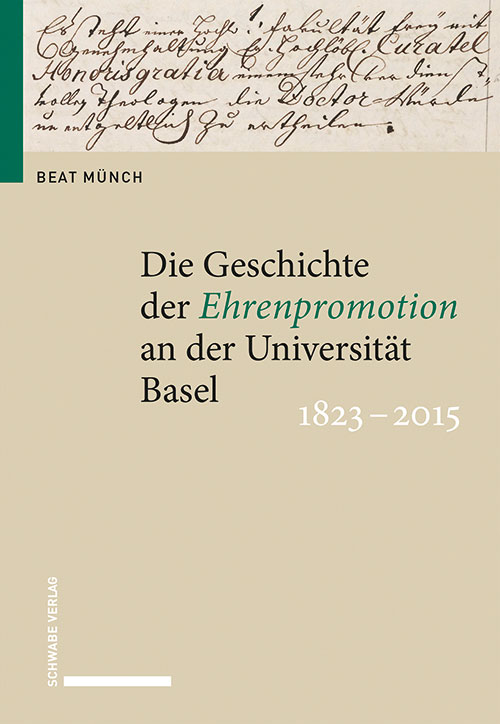How the University of Basel modernized with the honorary doctorate
When universities award the title of honorary doctor, there is always an element of self-promotion involved. The introduction of the honor some two hundred years ago helped to turn dusty institutions of higher education into modern universities.
21 November 2024 | Text: Urs Hafner
The star didn’t have time to come to Basel for the award ceremony, but he did send a video message expressing fulsome thanks for the “absolutely huge, fantastic, great honor.” In 2017, at its 557th Dies academicus, the University of Basel awarded an honorary doctorate to tennis player Roger Federer, the first and so far last professional athlete to have received this honor. Federer could now call himself “Dr. med. h.c.” if he wanted to, which of course he doesn’t. “H.c.” stands for “honoris causa” (honorary), and “med.” refers to the Faculty of Medicine, which nominated Federer. The faculties themselves select their honorary doctors, who are honored at the anniversary celebration of the university.
The awarding of the title met with criticism. Some media outlets made fun of the PR campaign, and some professors and many members of the public could not understand why Federer, a school dropout, king of self-marketing, and owner of a luxury apartment in Dubai, should receive academic awards. But despite this confusion, by offering Federer a doctorate, the University of Basel was doing nothing more than importing a tradition of the English-speaking world to Europe.
Dr. Marketing
In this tradition, the academic doctorate and the honorary doctorate are two entirely different beasts. An academic doctorate, otherwise known as a PhD, only became common in the 19th century. An honorary doctorate is awarded primarily for social merit and has limited academic value. In the USA, therefore, recipients of honorary doctorates may not use them as part of their names. They are awarded to patrons, famous athletes and other celebrities. The goal is clear: the universities, which are predominantly privately funded, use the awarding of titles as PR and to help find new sources of finance.
In Europe, on the other hand, the honorary doctorate is closely linked to the academic doctorate, which was introduced in the Middle Ages by the University of Bologna. This is demonstrated by Beat Münch, who holds a doctorate in Romance studies and is a former Academic Associate to the President of the University of Basel, in his book on the history of honorary doctorates from their beginnings to 2015. The focus is on the University of Basel, but Münch provides no less than a comprehensive overview of the entire development of this unique title.
For example, the University of Basel uses the same degree certificate for both titles – honorary doctorate and conventional doctorate. The honorary doctorate has academic weight in Europe, and professors and doctors pride themselves on the title. At the beginning of the 19th century, it even contributed to the emergence of the modern university, which was conceived as an establishment for research. Basel was at the forefront of this.
Honor to whom honor is due
At the end of the 18th century, most of Europe’s universities were in a lamentable state. Professorships were often inherited within families, and academic credentials were available for sale and not always even necessary to obtain a professorship. The new Humboldt University in Berlin put an end to this in 1810. Named after its founder, the scholar and statesman Wilhelm von Humboldt, it was an institution bent on reform.
It introduced the unification of teaching and research, as well as the concept of “free study,” which left time for leisure, and the title of “Dr. h.c.”. The faculties awarded this title to individuals they deemed to be academically proficient. A new aspect was that it was equivalent to a regular doctorate.
In 1818, the crisis-ridden University of Basel came under state supervision. However, the faculties still determined the doctoral study regulations. In 1823, they introduced the honorary doctorate in accordance with the Humboldt University model. “The university most likely owes its modernization to the German theologian Wilhelm Martin Leberecht de Wette, who had been appointed shortly before, and brought the concept with him from Berlin,” says Beat Münch.
The first to be honored was Rudolf Hanhart, principal of the Basel high school at Münsterplatz and associate professor of education, for his services to the local school system. “The honorary title was awarded to individuals who had a proven track record of academic performance, but either did not work at the university or did not have an academic title,” says Münch. Among them in the 19th century were teachers and pastors who earned achievements in geology, then an emerging field, and enjoyed a reputation throughout Europe.
Academic achievement vs. celebrity
Until the beginning of the 20th century, the honorary doctorate retained the character of its early days. It was not awarded publicly, the recipients were usually people from the local area, and they learned of their nomination when they received a degree certificate. “The integration of the awarding of the title into the Dies academicus in the mid-20th century gave the ‘h.c.’ the status it has today,” says Beat Münch. The press began to report on the ritual, people traveled to receive their honor and were profiled by the media. “This made the honorary doctorate a tool for the university’s self-image, strengthening its connection with society.”
International experts, celebrities and even patrons were increasingly being honored, while local honors declined. By awarding the title publicly – for example, to the Basel film producer and Oscar-winner Arthur Cohn in 2006 – the university hoped to benefit from some of their reflected glory. This encouraged them to place celebrity status above academic achievement or social commitment. This trend affected all universities in Europe, not just Basel.
However, the Federer doctorate may have been a tipping point for the University of Basel. For example, the Faculty of Business and Economics and the Faculty of Psychology, both newly founded around the turn of the millennium, award honorary doctorates mostly to academics. The trend towards preferring academic status is now even noticeable in the US, where universities such as the Massachusetts Institute of Technology generally do not award honorary doctorates in order not to diminish the value of academic doctorates.
In early June 2024, however, Dartmouth College, a member of the elite Ivy League, awarded Roger Federer another honorary doctorate. Unlike in Basel in 2017, he traveled there and gave a speech.
History of the honorary doctorate in Basel
In his book, the former Assistant to the Rector, Dr. Beat Münch, places honorary doctorates in the development of academic degrees in Europe and in the context of university history. He gives an overview of honorary doctorates at the University of Basel and lists all 786 honorary doctorates awarded up to 2015 with names, short biographies and award rationale. An alphabetical and a chronological index complete the volume.
Beat Münch: Die Geschichte der Ehrenpromotion an der Universität Basel 1823–2015. Schwabe Verlag, Basel 2024, 72.00 CHF.



